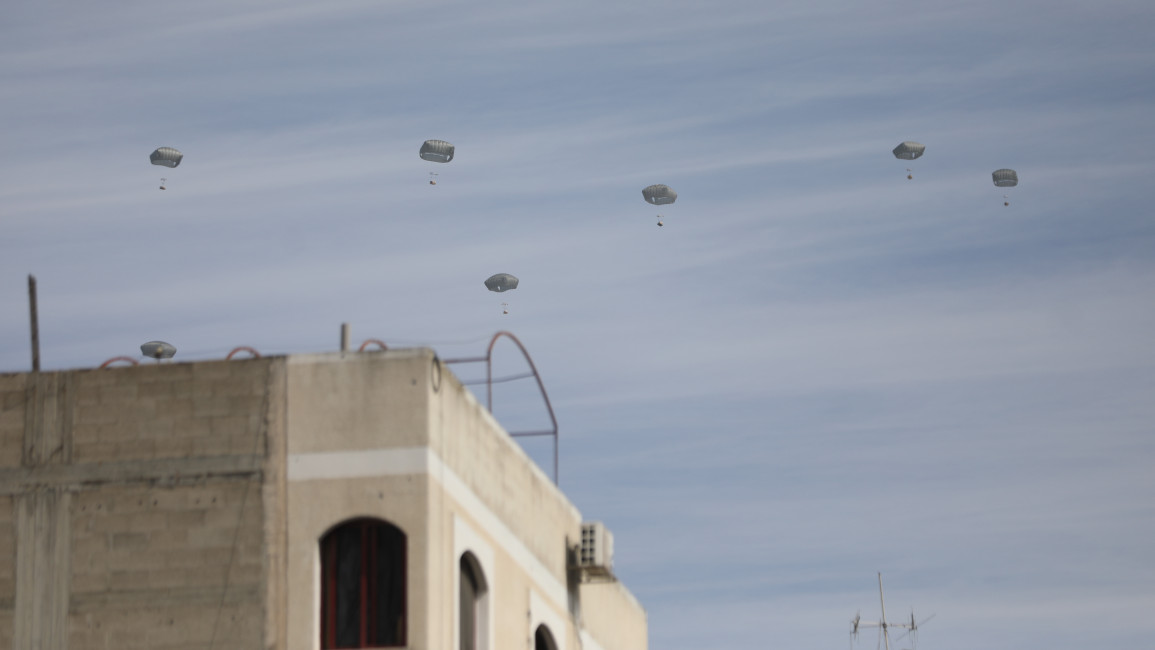Morocco joins Gaza aid airdrop amid pro-Palestine groups concerns
Morocco has joined international efforts to airdrop aid to the Gaza Strip; however, local Pro-Palestine groups are far from satisfied.
On Monday, Rabat reportedly sent six military planes carrying aid materials to Gaza, set to be airdropped on the besieged strip, where a manufactured famine has killed at least 27 Palestinians while Israel continues indiscriminate bombings on the city.
"Moroccan leadership requested the government in Israel to send humanitarian aid planes, and the latter responded positively to Rabat's request," said a source from the Israeli foreign ministry quoted by the local media Hespress.
So far, the Moroccan foreign ministry has not officially confirmed the aid.
The New Arab contacted the Moroccan foreign ministry, but no one could give further information on the aid.
Last November, Morocco, in coordination with the Egyptian Red Crescent, delivered 25 tons of food, water, medicine, and other essential medical supplies to the Gaza Strip.
However, Rabat's reported new aid to the strip seems to fall short of redeeming its ties with the country's pro-Palestine groups – a community of anti-normalisation activists who call for revoking the Moroccan normalisation with Israel.
"Airdropping aid is a humiliation to our brothers in Gaza. The solution is pressuring Tel Aviv to end its genocide in Gaza," said a source from the Moroccan Front against normalisation, as the group has so far refrained from releasing a statement on the aid amid the lack of official confirmation.
Established in 2021, a month after Rabat and Tel Aviv signed the normalisation deal, the group argues that the Abraham Accords have encouraged Israel's violence.
"Without the Arab countries' silence and complicity, (...) Israel would not feel emboldened to continue its genocide," said Aziz Al-Hanaoui, a Moroccan pro-Palestine activist, during a protest over the weekend.
During Ramadan, starting on 12 March, Moroccan pro-Palestine groups are set to protest daily around the North African kingdom after Tarawih prayers, demanding an immediate and permanent ceasefire in Gaza.
On Saturday, 9 March, US military planes and Jordanian forces began airdropping food and supplies into Gaza.
According to US Central Command, they dropped some 38,000 meals with parachutes along Gaza's coastline on Saturday.
"Airdrops are probably the most inefficient possible way to deliver aid (...) considering the volumes (of aid) are smaller, and 8 to 10 times more expensive," said Jeremy Konyndyk, president of Refugees International, in NPR's All Things Considered podcast.
Five people were killed and ten injured when they were hit by a pallet of aid parachuted into Gaza as part of a humanitarian airdrop.
The UN said airdrops or a proposed maritime aid corridor could not be a substitute for land deliveries, urging more trucks to be permitted to reach Gaza through more border crossings.
More than 2 million people live in the Gaza Strip, and according to the UN, a quarter of them face imminent starvation as Israel continues to hinder the entry of humanitarian aid.
According to the Palestinian Red Crescent, an average of 95 aid trucks entered Gaza daily between 10 October and 1 February, down from 500 commercial and aid trucks a day before the war.
Israel has waged a deadly military offensive on the Gaza Strip since a 7 October attack led by the armed Palestinian group Hamas into and around the Gaza envelope, in which nearly 1,200 people were killed.
Since then, Israel has killed at least 31,100 Palestinians, mostly women and children, and over 72,700 others were injured amid mass destruction and shortages.
Israel stands accused of genocide at the International Court of Justice (ICJ). An interim ruling in January ordered Tel Aviv to stop genocidal acts and take measures to guarantee that humanitarian assistance is provided to civilians in Gaza.



